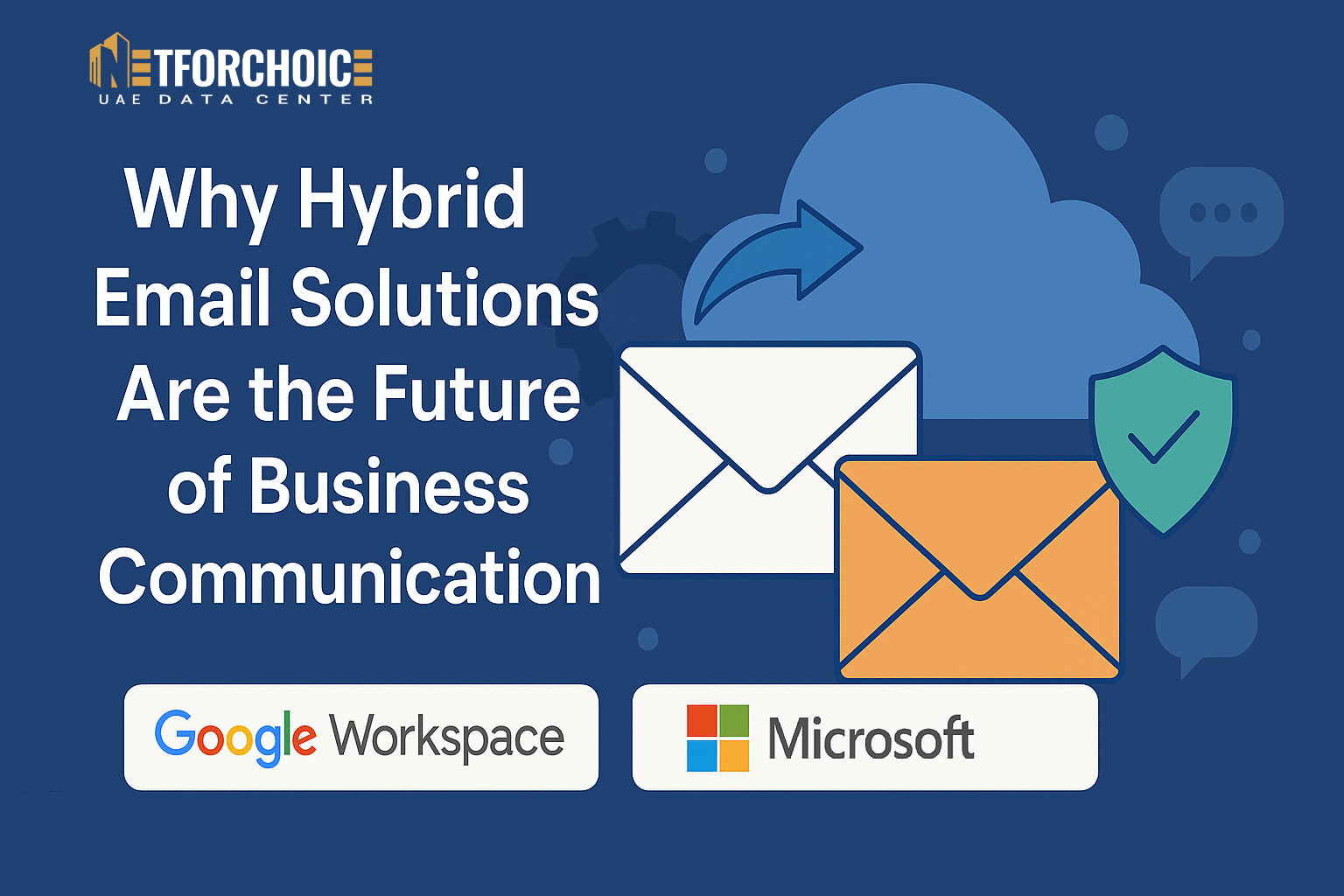Why Hybrid Email Solutions Are the Future of Business Communication?

Email is still the foundation of business communication in the modern digital-first world. In secret agreements to daily customer communication, businesses cannot operate without a stable, safe and effective business email service. The question is here, though–should companies remain on-premises email servers to gain control and compliance, or move to cloud-based email services such as Microsoft 365 and Google Workspace to have scalability and flexibility?
The fact is that both methods have drawbacks. Premises systems can be costly in terms of heavy infrastructure, and cloud-only solutions can create compliance, cost or data residency issues. This is where Hybrid Email Solutions come in–a combination of the best cloud and on-premises email to enable businesses to be flexible, cost-effective, and secure.
What is a Hybrid Email Solution?
A Hybrid Email Solution refers to a business email model, which is a mix of cloud-based and on-premises email environment. Secure on-premise servers can host some users, such as executives or compliance-intensive departments, whereas other users, such as sales and support teams, can be deployed on less expensive cloud email systems.
By doing so, the companies will be able to handle workloads in a smart way: sensitive information remains under a tight rein, whereas general users have the convenience of collaboration tools provided by the cloud.
Simply put: Hybrid Email is a hybrid engine, it is running two engines in one, providing businesses with control, flexibility and cost optimization without loss of user experience.
The Reason Why Businesses should have Hybrid Email Solutions.
Contemporary businesses require flexibility and inexpensive security. This is possible through Hybrid Email. This is why it is being embraced by businesses:
Cost Optimization: Not every employee requires high-quality cloud accounts. Hybrid configurations give companies the ability to blend and combine users to achieve enhanced ROI.
Regulatory Compliance: Store confidential information on private servers and continue to use cloud services to work together.
Migration Flexibility: Migrate to the cloud, not in a risky all-at-once migration.
Business Continuity: When one system crashes, the other keeps the communication alive- ensuring that it is up.
Scalable to Growth: Add cloud users or scale on-premise environments easily without workflow interruption.
A strong Business Email Solution, either hybrid or full-fledged, should not simply provide email sending and receiving facilities. Enterprise-grade functionality that is secure, compliant and productive is required by businesses.
Business email solution some key features include:
- Sophisticated Security: In-built spam filtering, anti-virus, encryption and Data Loss Prevention (DLP).
- Archiving & eDiscovery: Assists in compliance with such regulations as GDPR, HIPAA, or DPDP India.
- Smooth Cooperation: Share of calendars, contacts, and integration with such apps as Teams or Slack.
- Availability: Can be accessed by all devices, desktop, mobile, or web.
- Scalability & Flexibility: Can be used by both SMEs and startups and large business.
- 24×7 Support: This is important in order to have minimum downtime and quicker troubleshooting.
It is clear that Hybrid Email is the best balance, and therefore, the most future-proof option of businesses.
Business Email Solution Use Cases Across Industries:
Hybrid Email is not a mere technological jargon. It has real life uses in industries:
- BFSI (Banking and Financial Services): In this case, customer data remains on-premises, whereas general employees have cloud-based accounts.
- Healthcare: Patient records are stored in a secure local storage, and the administrative teams rely on cloud mail to be efficient.
- SMEs & Startups: Savings in cost of operations by operating a combination of basic and premium accounts.
- Enterprises: Non-disruptive migration to cloud with no downtime, meaning massive migrations occur in stages.
The help of NetForChoice Hybrid Email.
At NetForChoice, we realize that businesses do not just require email, but they require trusted, compliant and scalable communications systems. Our Hybrid Email Solutions provide:
- Security at Business-Level: SOC surveillance, anti-spam and encryption to ensure maximum security.
- Compliance Support: This is meant to be compliant with the GDPR, HIPAA and the DPDP requirements of India.
- Fluid Integration: Supports Microsoft 365, Google Workspace and on-premise email vendors like Carbonio/Zimbra.
- 24×7 Expert Support: Supported by our Tier-4 Data Centers and Security Operations Center (SOC).
Under NetForChoice, companies do not simply receive email, they receive a communication strategy that is future-proofed.
Summary: Hybrid Email is the Future of Email.
Hybrid Email Solutions offer the right mix in a world where compliance, cost, and collaboration are all equally important. Flexibility and control are no longer a choice that companies have to make, they can have both.
The shift to Hybrid Email is the one to make when your organization requires cutting costs, improving compliance and continuity in communication.
Hybrid Email Solutions FAQs.
Q1: What is the primary benefit of hybrid email?
Hybrid email is a cloud-based system with the security of on-premises systems, providing businesses with cost-saving and compliance.
Q2: Can small businesses use hybrid email?
Yes. The cost optimization in SMEs is that only the important accounts are kept in the private servers and the rest in the cloud.
Q3: Which email is more secure hybrid or cloud only?
Hybrid configurations are more secure because sensitive information can remain on-premise.
Q4: Does hybrid email support Microsoft 365 or Google Workspace?
Absolutely. Hybrid email is compatible with major cloud service providers without the need to discontinue on-premises servers.
Q5: Is hybrid email cost saving?
Yes. The premium cloud accounts are only paid by companies where the need arises, which saves on the total email management costs.

